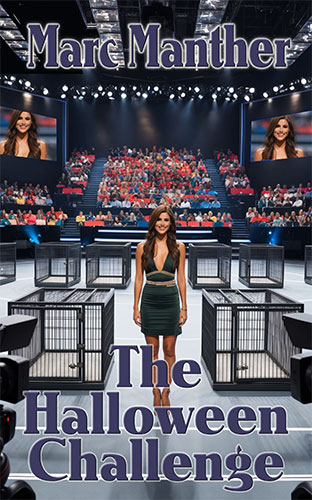Marc Manther has been dealing intensively with the phenomenon of reality TV shows and their effects on the participants for quite some time. With “Isabell’s Casting” he published the prelude to a planned series about a casting show called “Erotic Actress Talent Search” (EATS) in March 2020. While the EATS series is still in development, Manther has now surprised his readers with the novel “Die Halloween Challenge”, which was written in a short period of time.
The story centers around Lea, a medical student who urgently needs money for her studies and for her mother’s operation. When she gets the chance to win 100,000 euros by participating in a Halloween TV show, she sees it as her last chance. What initially appears to be an ordinary reality show develops into a profound social critique. The novel addresses the precarious financial situation of many students and the moral boundaries they are willing to cross.
The novel has a strong erotic dimension and works intensively with the ENF genre. However, Manther goes well beyond the typical genre conventions.
While classic ENF stories often stop at the superficial portrayal of female exposure and humiliation, “The Halloween Challenge” uses these elements as a starting point for a deeper exploration of power, control and social constraints. The protagonist Lea does experience classic ENF situations, but these are always embedded in a larger context.
The development of the main character is particularly interesting: the initial involuntary exposure develops into a complex examination of her own sexuality and self-determination. The erotic scenes are explicit, but they don’t just serve to stimulate; they also drive the character’s development and support the novel’s socially critical dimension.
The second part of the novel then almost completely abandons the classic ENF tropes and turns to the social consequences. It deals with slut-shaming, media witch hunts and the double standards of a society that simultaneously consumes and condemns female sexuality.
Manther uses the conventions of the ENF genre to simultaneously deconstruct them and exploit them for his socially critical message. This makes “The Halloween Challenge” an interesting hybrid between erotic literature and social novel.
For genre purists, the novel may be too “literary”, while classic literature fans may be disturbed by the explicit scenes. But it is precisely this transgression that makes the book so appealing. It is aimed at adult readers who are interested in the dark side of the entertainment industry and are willing to deal with social taboos. The novel raises important questions: How far would people go for financial security? What role do the media and society play in the exploitation of vulnerable people? And what happens when private moments suddenly become public?
Manther manages to address these complex issues in a sensitive yet gripping way. The Halloween Challenge is more than just entertainment literature – it is a mirror of our time and its moral challenges.


